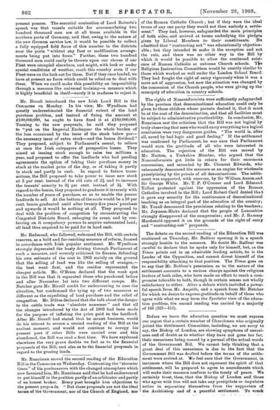. .
Mr. Runciman moved the second reading of the Education Bill iii the iomwons on Wednesday. Contrasting the "stormier times" or his predecessors with the changed atmosphere which liow favoured him, Mr. Runciman saicl that he had endeavoured to put himself in the position partly of an arbitrator and partly of an honest broker. Every post brought him objections to the present proposals. " But these proposals are not the ideal terms of the Government, nor of-the Church of England, nor of the Roinan Catholic Church ; but" if they were the ideal terms of any one party-they would not then embody a settle- nient." They had, however, safegiiatded the main principles of both sides, and arrived at terms embodying the pledges given by Liberal Members to their' constituents. He admitted that "contracting out" was educationally objection; able ; blit they intended Id male it the -exception and not the rule, and there was no 'other way in the Bill by which it would be possible to allow the continued exist-- ence of Roman Catholic or extreme Church schools. Tim Religious Instruction Committees would be 01ta:CUY tb those which worked so well under the London Seliool- Board: They had fought the right of entry vigorously when it was a mere act of aggression, but now the situation was changed by the concession of the Church people, who were giving up the monopoly of education in country schools.


















































 Previous page
Previous page